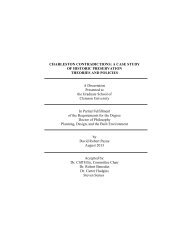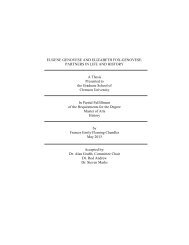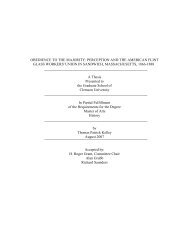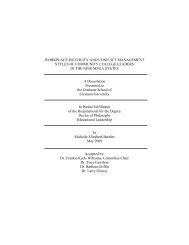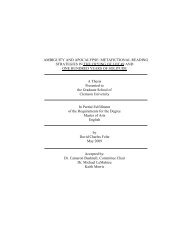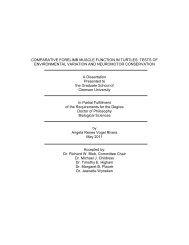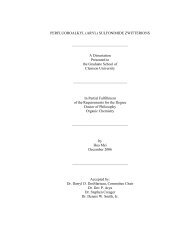FIGHTING FOR REVIVAL - Clemson University
FIGHTING FOR REVIVAL - Clemson University
FIGHTING FOR REVIVAL - Clemson University
You also want an ePaper? Increase the reach of your titles
YUMPU automatically turns print PDFs into web optimized ePapers that Google loves.
Against this cultural backdrop, Edgefield proved a fertile breeding ground for<br />
political leadership during the early republic and antebellum period, for its voting<br />
populace comprehended and encouraged such forms of public physical assertion of honor<br />
as a necessary part of manhood. Edgefield’s rather rapid assent from the status of frontier<br />
to the ranks of a plantation culture allowed for its concept of honor to be highly energized<br />
and more frequently exercised.<br />
Orville Vernon Burton makes the same connections between Edgefield culture<br />
and broader Southern culture, though his focus is upon the family origin and dynamic of<br />
this connection than the politicians’ conception and projection of the ethic of honor.<br />
Notions of honor and virtue were characteristic of the southern family, and<br />
the families of Edgefield were no different. Edgefield youths heard of<br />
their virtuous ancestors and were taught that they also should live by a<br />
moral code. Ideas of individual, family, and community honor were<br />
instilled from youth. Honor generally connoted personal rectitude,<br />
independence of spirit, and the courage to maintain these characteristics<br />
against challenges. It meant living by one’s word, no matter what the<br />
consequences. Finally, honor meant having to seek redress for grievances<br />
and defending perceived “rights.” 81<br />
Given this cultural foundation, it is little wonder that Edgefield’s political sons<br />
exhibited a tendency toward this same sense of honor and violence. Names such as A.P.<br />
Butler, George McDuffie, Preston Brooks, Francis Pickens, James Henry Hammond,<br />
Louis T. Wigfall read like a who’s who of political stalwarts of the pre-war South, and all<br />
called Edgefield home. All were frequently involved and well versed in the actions and<br />
language of honor and violence. Duels, shootings, and personal affronts to honor were<br />
81 Orville Vernon Burton, In My Father’s House, 90.<br />
36



